- Home
- Vince Flynn
American Assassin: A Thriller Page 15
American Assassin: A Thriller Read online
Page 15
Stansfield stewed over their personalities for a good five minutes and then decided he needed to go to the meeting. The outcome was preordained. Hurley had never liked this Rapp fellow, and while Kennedy and Lewis were formidable, Hurley would wear them down with his bombastic, stubborn ways. And in truth, it was his call. As the person in charge of field ops he needed to be able to trust his men without question. Stansfield became stuck on the team concept for a second. Through all of the bickering and managing of egos, they had lost sight of one very important fact--the new recruit had not only succeeded, but had done so on his own. He arrived in Istanbul and less than twenty-four hours later he had successfully removed a very nasty thorn in America's side. There were a number of allies who would be cheering Sharif's death as well, and Stansfield hoped that at least one of them would be blamed. As much as Stansfield would love to take the credit for the assassination of Istanbul's merchant of death, he couldn't. The Orion Team needed complete anonymity or they risked investigation and exposure, which would in short order render them useless. That was why these new recruits could have no link whatsoever to Langley.
But what was the sense of any of it if you didn't engage the enemy and make him bleed? Stansfield had to be cautious with his hopes, though. How much of this was wishful thinking? He had yet to meet the young man. Who was to say this Rapp fellow wasn't in reality an uncontrollable asset who would eventually blow up in his face? Lewis didn't think so, and that was worth something, but still Stansfield realized he needed to meet this fellow and find out for himself what he was made of. If he was as good as some of them were saying it would be a tragedy to throw him away.
Stansfield asked his security detail to prepare for the vehicular version of a shell game. Langley kept a number of nondescript, windowless vans in the motor pool for just this type of thing. As the Operations boss, Stansfield did not have to inform anyone of his needs. His security detail only had to show up and take what was available. The detail had access to extra license plates and a variety of magnetized decals to help facilitate the deception. At seven-oh-four they left the back service gate at Langley in a white van with the Red Carpet Linen Service logo on the sides.
They headed for Tyson's Corner and once inside the busy parking structure, Stansfield was moved to a Ford Taurus. Fifteen minutes later, he found himself standing alone, under a tree next to the main entrance of George Mason University. The Dodge minivan was parked across the street. Stansfield waited for five minutes and then the vehicle flashed its brights. After climbing into the backseat he handed Joe, head of his security detail, a piece of paper with an address on it. The driver memorized the address and handed the paper back to his boss. He briefly consulted his road atlas and then put the car in drive. Five minutes later they were at the office park.
"Joe," Stansfield said, leaning forward, "take us around back. There's a call box and a code for the door."
When they reached the back of the building Stansfield got out and punched in the code. He trusted Joe, but the fewer people who had the numbers, the tighter the circle remained. Stansfield motioned for Joe to pull in and then pressed the big red button to close the door. Four cars and a motorcycle were already parked inside. To the right, shelves, like the kind you'd find in a library, jutted out from the near wall. They were filled with software titles that were legitimately being shipped overseas. To the left were pallets and boxes and then a sea of darkness.
Stansfield headed for the offices and asked Joe to stay with the car. There was a cipher lock on the door. He punched in the four-digit code, leaned into the door, and was immediately aware of loud shouts coming from just ahead.
Stansfield frowned and wondered first and foremost why the conference room hadn't been soundproofed. He also wondered why these supposed professionals were incapable of keeping their tempers in check. As he stepped into the room, he almost didn't notice the man sitting at the break table reading a magazine.
"They've been at it like that for almost an hour."
Stansfield recognized the face instantly. "Mr. Rapp, I presume."
CHAPTER 26
RAPP didn't know who the man was, but there was something about him that instantly garnered respect. The gray hair, charcoal suit, shiny wing tips, discerning eyes, and the fact that he'd just walked unannounced into the secure building told him he was standing before someone who more than likely had an office on one of the top floors at Langley. After he gave him the onceover, he couldn't help but think the man reminded him of a more slender version of Spencer Tracy. Rapp decided he'd better stand. He offered his hand and said, "Yes. And you are ...?"
Stansfield gave him a grandfatherly smile. "George."
Rapp studied him with suspicion. "That's not your real name, is it?"
"No," Stansfield said.
After a moment Rapp said, "Any chance you're the guy running this show?"
Stansfield gave him a relaxed smile. "When you get to my age you better be running something, or it's time to retire. Please sit." He motioned with his right hand toward the chair Rapp had been sitting in. Rapp returned to his seat. Stansfield smelled coffee and found a pot on the counter. He helped himself. "Would you like some?"
"No thanks."
After joining him at the break table, Stansfield blew on his coffee and said, "I hear you've been making waves again."
Rapp wasn't sure how much he should say, so he shrugged his shoulders and kept his mouth shut.
"Would you care to walk me through your decision?"
"What decision would that be?"
"Why you decided to act on your own in Istanbul?"
Rapp's dark eyes narrowed. He studied the old man for a few seconds. He was in enough hot water for breaking their damn rules. He wasn't about to break another. "I'm afraid I don't know what you're talking about."
Stansfield grinned. "I'm afraid you do."
"I'm at a bit of a disadvantage. If you're who I think you are, you know I can't discuss any of this with someone unless they give me the green light." Rapp jerked his head toward the conference room door.
"Good point. You don't know me, and that's for good reason, but I know you."
Rapp gave him a dubious look that changed into a humble one as the silver-haired man recited his life story, including date of birth, Social Security number, parents' names, a long list of athletic accomplishments, and his relative strengths and weaknesses. It wasn't until the last part, though, that Rapp began to feel vulnerable.
"Three days ago you used a 9mm Beretta pistol to execute a man at point-blank range. Here and here." Stansfield touched his heart and then tapped the bridge of his dark glasses. He looked at the door to the conference room and said, "You have one avid supporter, another who thinks you have great potential, and one very forceful detractor. They are in there deciding your fate right now. If you want to continue on your current career path, I am more than likely your best hope. So if you have anything you'd like to say, now is the time to do it."
That this man knew so many details about his life and was able to recite them, chapter and verse, without a single note, told Rapp all he needed to know. "You seem to have most of the facts." He carefully turned the question back on George by saying, "I'm sure you've formed some opinions."
Stansfield sat back and crossed his left left over his right. "I'm hearing conflicting stories. That is why I decided to meet you in person."
"What are the conflicting stories?"
"You appear to be a man who is possibly uniquely suited for this line of work. You also appear to have a hard time following rules, and that, young man, can be a dangerous thing."
Rapp nodded. It was becoming apparent that Spencer Tracy's little brother really was the guy who ran this entire show, which meant he needed to get him in his corner, and do it before Hurley sank him once and for all. "Sir, would I be totally off the mark if I guessed that at some point in your career you spent some time in the field?"
Stansfield grinned but did not answer the question.
"And when you were in the field, did things always go as planned?"
Stansfield saw instantly where he was headed. "There's a big difference between adapting and disregarding orders."
Rapp nodded and was sullen for a split second. That was exactly what Hurley had screamed at him, with a few colorful words thrown in to boot. If Doc Lewis hadn't been there, Rapp was pretty certain they would have come to blows.
"To be fair," Stansfield continued, "I use great caution when I evaluate a decision that someone has made while operating in a high-stress environment."
The man's choice of words gave Rapp pause. He considered them carefully and then said, "High-stress?"
"Yes."
"I'm not sure I'd call it high-stress, sir."
Stansfield's eyes sparkled with amusement. "You snuck into a foreign country using a false identity, killed a man at close range, and then made it out of the country all on your own. You didn't find any of that stressful?"
"The getting-out part ... maybe a little, but really only getting out of Istanbul. After that the odds of getting caught were pretty low."
"Why did you decide to act on your own?"
"I didn't go to Istanbul thinking that I would handle the job on my own. It happened. It evolved. I saw the opportunity and I took it."
"What do you mean you saw the opportunity?" Stansfield was keenly interested in the young man's next words.
"I read the surveillance briefing that the Brits gave us..."
Stansfield held up his hand and stopped him. "Who told you the Brits gave us that report?"
"No one."
"Then why did you say the Brits gave it to us?"
Rapp shrugged as if to say it was obvious. "I could tell by the way it was written."
Stansfield nodded for him to continue and made a mental note to revisit the subject later.
"I read the report and there it was ... it jumped right off the page."
"There what was?"
"The opportunity. The report said that the target took his dog to the park every morning. He sat on a park bench and talked on his cell phone while he threw a ball to his little dog." Rapp turned his palms up and said, "How does it get any easier than that? No bodyguards to deal with, no drivers or armor-plated cars, no security cameras ... very few witnesses, and the few who are around are busy living their own lives."
"And it didn't occur to you to pass this information on to Stan?"
"It did, but it also seemed like it was too good to pass up."
"If you'd brought it to Stan, you wouldn't have been passing it up."
"You're not serious."
"Completely."
"If I had brought my idea to Stan he would have called me a moron and told me to shut my mouth."
The young recruit was probably right. "Stan is very good at this type of thing. This is not his first dance."
"So I've been told," Rapp said, unimpressed.
"You have some problems with Hurley, I hear."
"Who doesn't?"
The point was more accurate than not. "Still ... he has a lengthy resume."
"I'm sure he does, but the entire thing was more complicated than it needed to be. The whole idea here is that we are supposed to get in, get it done, and get out without anyone noticing we were there. If we'd stuck with Stan's plan, we would have followed the guy around for five days and come to the same conclusion that was right there in the Brit report, and our odds of screwing up somewhere ... being noticed ... would have increased fivefold at least."
He was probably right, but Stansfield didn't tell him so. He would have to deal with Hurley later. "When did you read the report?"
"When I got to the safe house."
"That first night."
"Yes."
"And you decided that night that you would handle it on your own?"
"No ... I saw the possibility, that was all."
"And when you decided to go to the park armed the next morning?"
"I thought there was a chance. I wanted to see with my own eyes and then decide."
"But when you left the safe house you were prepared to kill him if the opportunity presented itself?"
Rapp hesitated and then admitted the truth. "Yes."
Stansfield took a sip of the coffee and slowly set the mug on the table. "Any other reason why you chose to act on your own?"
"How do you mean?"
Stansfield gave him a knowing grin. "I was your age once ... a long time ago. I was asked to do certain things for my country, and until I actually did them, I wasn't sure I had it in me."
Rapp looked down and studied the pattern in the gray-and-black carpeting. It was not in his character to be this open with someone he'd just met, especially on a subject like this, but there was something about this guy that made it difficult to be anything but forthright. "I wanted to kill him," he finally said.
"Revenge?"
Rapp shrugged his shoulders in a noncommittal way.
"Remember ... we recruited you for a reason. I know what you went through. I know how you were affected by Pan Am Lockerbie."
"Revenge, justice ... I don't know. I just know when I left for the park that morning I wasn't sure, and then as soon as I laid eyes on him I wanted to kill the bastard. I was sick of all the planning and talking. It made no sense that it had to be so complicated."
Stansfield took off his glasses and looked at Rapp with his gray-blue eyes. "Any other reason that may have pushed you over the edge?"
Rapp looked at the carpeting again. He hadn't even admitted the next part to himself. At least not fully. Without looking up he said in a soft voice, "I was afraid I wouldn't have the guts to do it."
With the understanding of someone who had walked the same path, Stansfield gave him a sympathetic nod. It had been a long time since Stansfield had killed a man, but he remembered the doubt that gnawed at him until he pulled that trigger for the first time. "How do you feel now?"
"How do you mean?"
"Now that you have taken a human life?"
Rapp gave a nervous laugh and checked his watch. "Do you have a few hours?"
"You know laughter is often a defense mechanism used to deflect."
Rapp thought of Doc Lewis. "I've heard that somewhere else recently."
"This isn't a good time to deflect."
Rapp noticed the concern on the old man's lined face. He fidgeted with his hands and then said, "This isn't exactly a topic I'm used to discussing."
"No ... you're right about that." Stansfield himself had never spoken to a soul about the men he had killed. It simply wasn't his way. There were others, though, whom he had worked with over the years, who were quite different in that regard. Some spoke with an intensity that was more academic, as if they were simply trying to perfect their craft for the sake of perfection. Others took a more lighthearted or twisted approach to their play-by-play analysis of how they had killed a man. The best ones, Stansfield had always felt, were the ones who kept it to themselves.
"This is very important," Stansfield said. "How are you up here?" The old man tapped his temple.
"I think I'm fine."
"No problem sleeping?"
"No, in fact I've slept better than I have in years."
"Good. I want you to understand something very important. Hamdi Sharif chose to get into the arms business, and he knowingly sold weapons to terrorist groups that were going to use those weapons to kill innocent civilians."
"I know."
"I am every bit as responsible as you for his death."
Rapp frowned and gave him a look that said he wasn't quite buying it.
Stansfield had expected that. "Who do you think sent you on that operation?"
"I don't know."
"I did. I was the judge and the jury. You were merely the executioner. Never forget that." He spoke with intensity for the first time in the entire conversation. He was almost pleading for Rapp to grasp the gravity of what he was saying.
Finally Rapp no
dded, even though he wasn't sure he fully grasped the man's meaning.
Stansfield stood and said, "Why don't you go home now?"
"What about their decision?"
"Don't worry. I'll smooth things out. Just try not to cause any problems for the next few months."
CHAPTER 27
THANK God," Lewis announced upon seeing Stansfield enter the room. "I can't spend another minute trying to talk sense into these two."
With pure disappointment, Stansfield glared down the length of the table, first at Hurley, who was on the left, and then at Kennedy, who was directly across from him. They were both on their feet. "Sit," he commanded. Kennedy sat. Hurley remained standing. "The first person who raises his voice is being sent to Yemen for the rest of his career."
"You can't send me anywhere," Hurley snarled.
Stansfield directed his full attention to Hurley and communicated his resolve with an icy stare that silently communicated the fact that he could do a lot worse than sending his ungrateful ass to Yemen. Of the three, Hurley was the only one who had seen this look before. It had been nearly three decades ago but Hurley still remembered that his stupidity had almost cost him his life, and if it hadn't been for Stansfield's magnanimous attitude he would have died that day. Hurley slowly sank to his seat.
"Have I failed you two so poorly that it has come to this?" Stansfield said in a calm but disappointed voice. "You scream at each other like children trying to bully their way to victory." He cocked his head in Kennedy's direction. "I expect far more from you. What did I tell you about losing control of your emotions?"
"That it's a weakness."
"Correct. And how has it worked for you this evening ... screaming at one of the most hotheaded men in all of our nation's capital? Did your logic become more clear? Did your points carry more weight? Did you somehow persuade him to see things your way by shrieking at him like some wild banshee?"
Kennedy shook her head, her embarrassment complete.

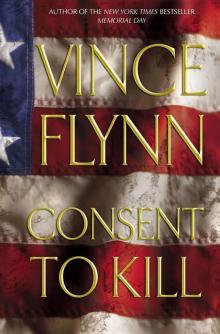 Consent to Kill
Consent to Kill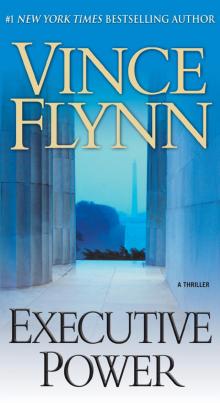 Executive Power
Executive Power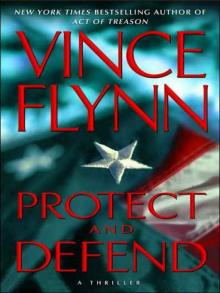 Protect and Defend
Protect and Defend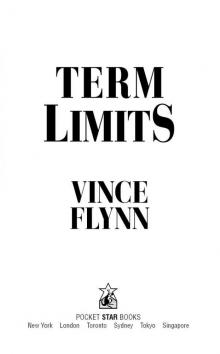 Term Limits
Term Limits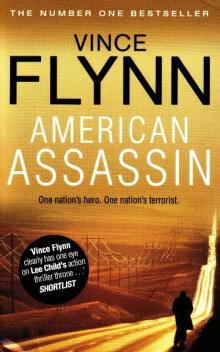 American Assassin
American Assassin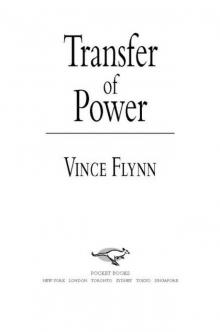 Transfer of Power
Transfer of Power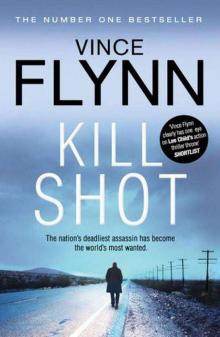 Kill Shot
Kill Shot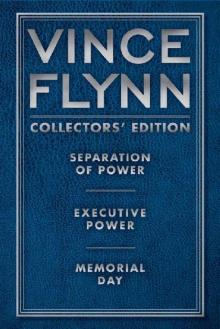 Vince Flynn Collectors' Edition 2
Vince Flynn Collectors' Edition 2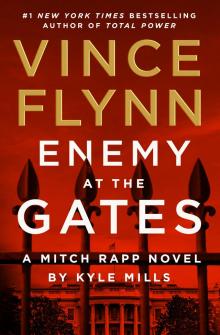 Enemy at the Gates
Enemy at the Gates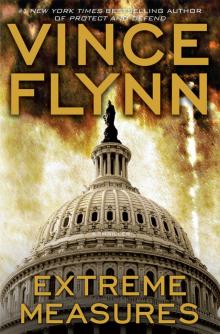 Extreme Measures
Extreme Measures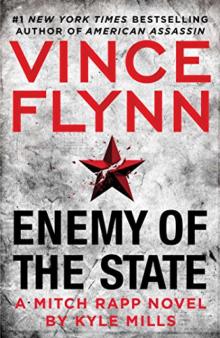 Enemy of the State
Enemy of the State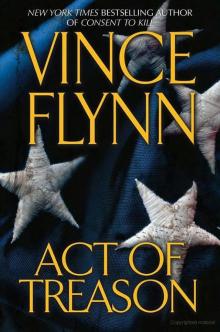 Act of Treason
Act of Treason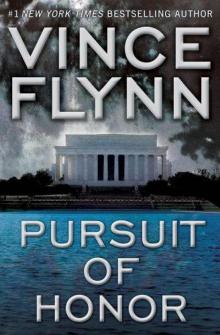 Pursuit of Honor
Pursuit of Honor The Survivor
The Survivor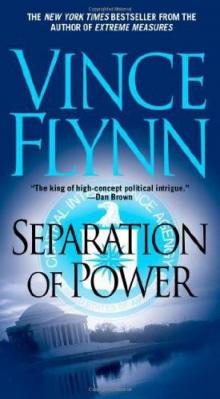 Separation of Power
Separation of Power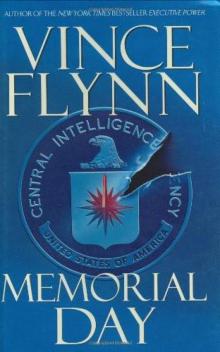 Memorial Day
Memorial Day The Last Man
The Last Man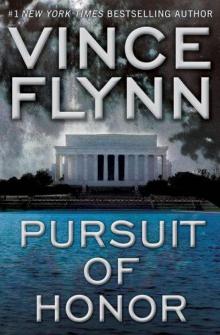 Pursuit of Honor_A Thriller
Pursuit of Honor_A Thriller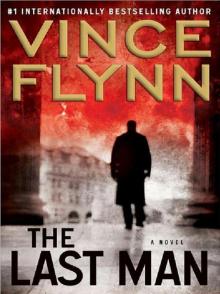 Mitch Rapp 13 - The Last Man
Mitch Rapp 13 - The Last Man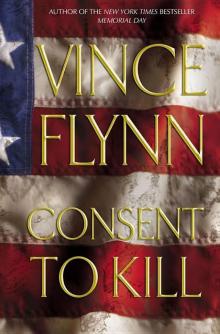 Consent to Kill:
Consent to Kill: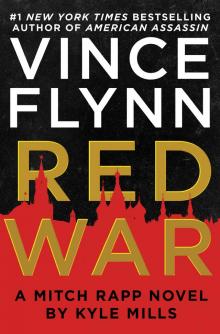 Red War
Red War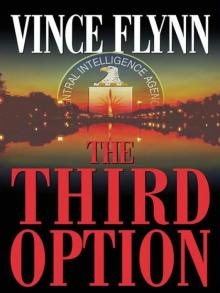 Mitch Rapp 02 - The Third Option
Mitch Rapp 02 - The Third Option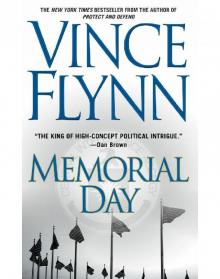 Mitch Rapp 05 - Memorial Day
Mitch Rapp 05 - Memorial Day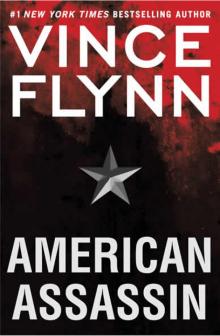 Mitch Rapp 11 - American Assassin
Mitch Rapp 11 - American Assassin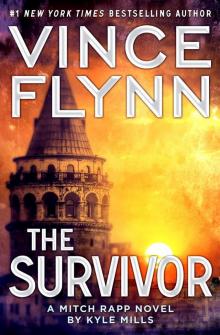 Mitch Rapp 14 - The Survivor
Mitch Rapp 14 - The Survivor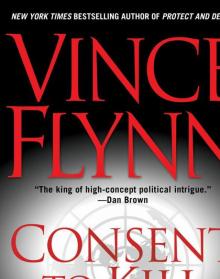 Mitch Rapp 06 - Consent to Kill
Mitch Rapp 06 - Consent to Kill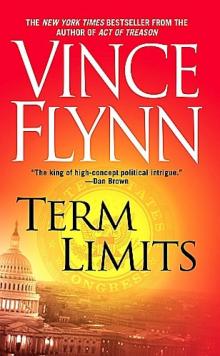 Term Limits mr-1
Term Limits mr-1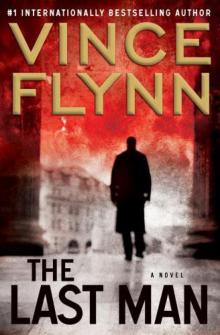 The Last Man mr-13
The Last Man mr-13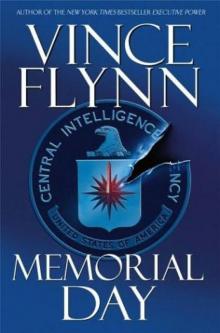 Memorial Day mr-5
Memorial Day mr-5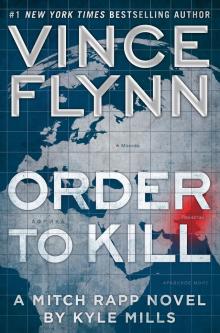 Order to Kill
Order to Kill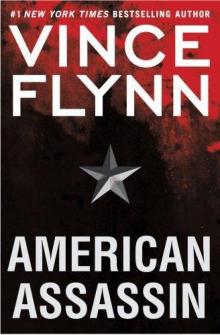 American Assassin: A Thriller
American Assassin: A Thriller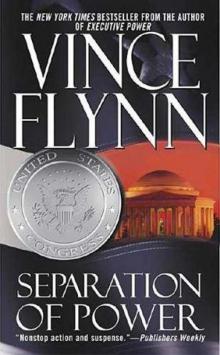 Separation of Power mr-3
Separation of Power mr-3